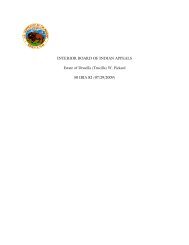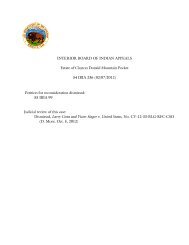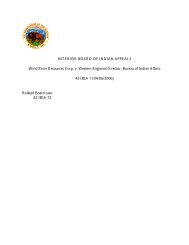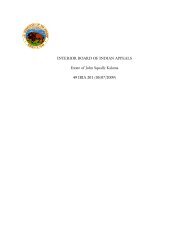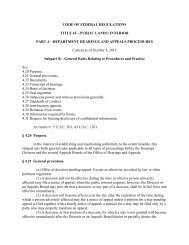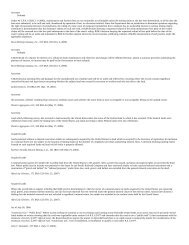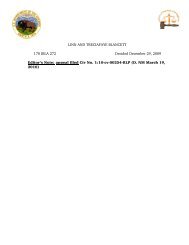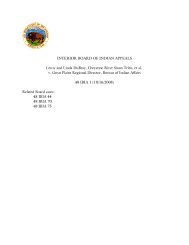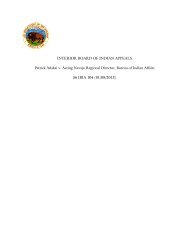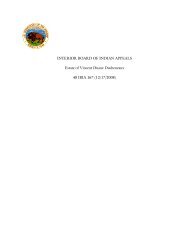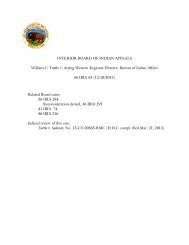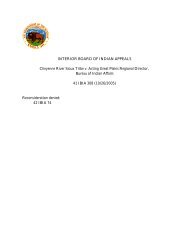45 IBIA 187 - About the Office of Hearings and Appeals
45 IBIA 187 - About the Office of Hearings and Appeals
45 IBIA 187 - About the Office of Hearings and Appeals
Create successful ePaper yourself
Turn your PDF publications into a flip-book with our unique Google optimized e-Paper software.
INTERIOR BOARD OF INDIAN APPEALS<br />
William H. Richards, Sr., Florene Travis, Pam Davis, Janelle Owings Brown,<br />
Lisa Richards, Venus Cornelis, <strong>and</strong> Marilyn Bray v. Acting Pacific Regional Director,<br />
Bureau <strong>of</strong> Indian Affairs<br />
Related Board case:<br />
40 <strong>IBIA</strong> 277<br />
<strong>45</strong> <strong>IBIA</strong> <strong>187</strong> (08/21/2007)
United States Department <strong>of</strong> <strong>the</strong> Interior<br />
OFFICE OF HEARINGS AND APPEALS<br />
INTERIOR BOARD OF INDIAN APPEALS<br />
801 NORTH QUINCY STREET<br />
SUITE 300<br />
ARLINGTON, VA 22203<br />
WILLIAM H. RICHARDS, SR.,<br />
FLORENE TRAVIS, PAM DAVIS,<br />
JANELLE OWINGS BROWN, LISA<br />
RICHARDS, VENUS CORNELIS,<br />
<strong>and</strong> MARILYN BRAY,<br />
Appellants,<br />
v.<br />
ACTING PACIFIC REGIONAL<br />
DIRECTOR, BUREAU OF INDIAN<br />
AFFAIRS,<br />
Appellee.<br />
) Order Affirming Decision in Part <strong>and</strong><br />
) Dismissing in Part<br />
)<br />
)<br />
)<br />
)<br />
) Docket No. <strong>IBIA</strong> 05-55-A<br />
)<br />
)<br />
)<br />
)<br />
)<br />
) August 21, 2007<br />
William H. Richards, Sr., Florene Travis, Pam Davis, Janelle Owings Brown, Lisa<br />
Richards, Venus Cornelis, <strong>and</strong> Marilyn Bray (Appellants), who bring this appeal collectively<br />
as <strong>the</strong> “interim tribal council,” seek recognition from <strong>the</strong> Bureau <strong>of</strong> Indian Affairs (BIA) as<br />
<strong>the</strong> properly elected governing body <strong>of</strong> <strong>the</strong> Smith River Rancheria (Tribe). Appellants<br />
appeal from <strong>the</strong> February 10, 2005, decision (Decision) <strong>of</strong> <strong>the</strong> Acting Pacific Regional<br />
Director, BIA (Regional Director), in which <strong>the</strong> Regional Director declined to recognize<br />
Appellants as <strong>the</strong> Tribe’s governing body. The Regional Director also determined that<br />
Appellants’ appeal was moot as to membership issues <strong>and</strong> recognition <strong>of</strong> <strong>the</strong> tribal council<br />
elected in May 2002.<br />
In <strong>the</strong>ir appeal to <strong>the</strong> Board <strong>of</strong> Indian <strong>Appeals</strong> (Board), Appellants contend that <strong>the</strong><br />
Regional Director erroneously concluded that <strong>the</strong>y were not entitled to recognition as <strong>the</strong><br />
Tribe’s governing body. Appellants maintain that <strong>the</strong>y were elected as <strong>the</strong> interim tribal<br />
council pursuant to a properly called election at which only eligible tribal members were<br />
permitted to vote <strong>and</strong>, <strong>the</strong>refore, <strong>the</strong>y — collectively as <strong>the</strong> “interim tribal council” — are<br />
entitled to recognition by BIA as <strong>the</strong> duly elected governing body for <strong>the</strong> Tribe. Appellants<br />
also argue that <strong>the</strong> Regional Director lacked evidence to determine that Appellants’<br />
remaining concerns regarding <strong>the</strong> Tribe’s regularly scheduled election in May 2002 have<br />
been addressed by <strong>the</strong> Tribe. We conclude that <strong>the</strong> Regional Director properly declined to<br />
recognize Appellants’ “interim tribal council” <strong>and</strong> we dismiss Appellants’ remaining claims<br />
for lack <strong>of</strong> st<strong>and</strong>ing.<br />
<strong>45</strong> <strong>IBIA</strong> <strong>187</strong>
Facts<br />
This appeal grew out <strong>of</strong> an election held by a group within <strong>the</strong> Tribe that called itself<br />
<strong>the</strong> Committee for Constitutional Rights <strong>of</strong> <strong>the</strong> Smith River Rancheria (CCR). The group<br />
maintained that certain amendments to <strong>the</strong> Tribe’s Constitution were improperly adopted<br />
by <strong>the</strong> Tribal Council during <strong>the</strong> 1990’s <strong>and</strong> that <strong>the</strong>se amendments affected <strong>the</strong><br />
membership criteria set forth in <strong>the</strong> Tribe’s Constitution. CCR maintained, as do<br />
Appellants herein, that numerous persons were enrolled in <strong>the</strong> Tribe pursuant to <strong>the</strong><br />
allegedly illegal constitutional amendments, that <strong>the</strong> new enrollees were permitted to run<br />
for tribal <strong>of</strong>fice <strong>and</strong> vote in tribal elections, <strong>and</strong>, <strong>the</strong>refore, <strong>the</strong> resulting tribal councils were<br />
1<br />
also “illegal.” Dissatisfied with <strong>the</strong> Tribe’s response to <strong>the</strong>ir concerns, CCR proceeded to<br />
hold its own election for an “interim tribal council.”<br />
By notice dated June 13, 2001, CCR invited “registered voters that were enrolled<br />
with [<strong>the</strong> Tribe] prior to May 21, 1994” to a meeting on July 14, 2001, <strong>of</strong> <strong>the</strong> “General<br />
2<br />
Membership” <strong>of</strong> <strong>the</strong> Tribe. The purpose <strong>of</strong> <strong>the</strong> meeting, set forth in <strong>the</strong> announcement,<br />
was to elect an interim tribal council, <strong>and</strong> to appoint an enrollment committee <strong>and</strong> an<br />
election board. CCR apparently established its own registered voter roll, consisting only <strong>of</strong><br />
3<br />
those persons it believed to be enrolled as tribal members prior to May 21, 1994. CCR<br />
<strong>the</strong>n sent separate notices, dated June 14, 2001, to those members enrolled on or after<br />
1<br />
It appears that Appellants believe that <strong>the</strong> Tribe must consist only <strong>of</strong> persons <strong>of</strong> Tolowa<br />
Indian blood <strong>and</strong>, instead, persons <strong>of</strong> Chetco <strong>and</strong> o<strong>the</strong>r Oregon Indian descent were being<br />
enrolled as tribal members. See Letter from Appellants L. Richards <strong>and</strong> Davis to Regional<br />
Director, June 25, 2002, at 7. According to Appellants, <strong>the</strong> recognized Tribal Council met<br />
with Appellants in March 2002 <strong>and</strong> explained that <strong>the</strong>re were several historic “statements”<br />
supporting Tolowa Indian ancestry for <strong>the</strong> members challenged by Appellants; Appellants<br />
claim that <strong>the</strong> “statements” are not “conclusive evidence” <strong>of</strong> Tolowa Indian ancestry <strong>and</strong><br />
Appellants claim to “have pro<strong>of</strong> that <strong>the</strong>se . . . members descending from Sarah Channon<br />
Brown Farnham Payne <strong>and</strong> Jessamine Brown Bravo do not descend from Tolowa blood.”<br />
Id.<br />
2<br />
Appellants Davis <strong>and</strong> L. Richards were identified as contacts for CCR on <strong>the</strong> meeting<br />
announcement.<br />
3<br />
Apparently, CCR selected May 21, 1994, as <strong>the</strong> cut-<strong>of</strong>f date because CCR believed that,<br />
beginning on that date, <strong>the</strong> Tribe has not had “a legal Tribal Council to take membership<br />
applications from anyone.” Notice from CCR to “Registered Voters Not Enrolled before<br />
May 21, 1994,” June 14, 2001.<br />
<strong>45</strong> <strong>IBIA</strong> 188
May 21, 1994, informing <strong>the</strong>m that <strong>the</strong>y would not be permitted to vote in <strong>the</strong> July 14<br />
election. The notice also advised <strong>the</strong> recipients not to “panic” because “nothing is being<br />
done with enrollment at <strong>the</strong> present time, you just won’t have <strong>the</strong> privilege to vote for one day.<br />
If you meet <strong>the</strong> enrollment criteria set forth in [<strong>the</strong> Tribe’s] 1987 Constitution, you have<br />
nothing to worry about with regards to enrollment.” Notice from CCR to “Registered<br />
Voters Not Enrolled before May 21, 1994,” June 14, 2001 (emphasis added).<br />
On July 14, 2001, <strong>the</strong> CCR meeting went forward, an election was held, <strong>and</strong><br />
Appellants apparently were elected as <strong>the</strong> new “interim tribal council” <strong>of</strong> <strong>the</strong> Tribe. In three<br />
letters, dated September 18, October 5, <strong>and</strong> December 31, 2001, Appellants sought<br />
recognition from <strong>the</strong> Superintendent, Nor<strong>the</strong>rn California Agency, BIA (Superintendent).<br />
In response to Appellants’ letters, <strong>the</strong> Superintendent repeatedly informed Appellants<br />
that <strong>the</strong> tribal governance dispute was an internal tribal matter ra<strong>the</strong>r than one for decision<br />
by BIA. According to Appellants, by letter dated February 5, 2002, <strong>the</strong>y dem<strong>and</strong>ed a<br />
4<br />
decision from <strong>the</strong> Superintendent on <strong>the</strong>ir request for recognition. On May 1, 2002,<br />
5<br />
Appellants appealed to <strong>the</strong> Regional Director pursuant to 25 C.F.R. § 2.8, claiming that<br />
<strong>the</strong> Superintendent had refused to render a decision. Appellants sought <strong>the</strong> following relief<br />
from <strong>the</strong> Regional Director: (1) an order directing <strong>the</strong> Superintendent to recognize<br />
Appellants as <strong>the</strong> Tribe’s interim governing body; (2) a finding that past tribal councils had<br />
improperly amended <strong>the</strong> Tribe’s Constitution to alter <strong>the</strong> Tribe’s membership criteria;<br />
(3) an order directing all members enrolled pursuant to <strong>the</strong> illegal membership changes to<br />
show cause why <strong>the</strong>y should not be disenrolled; (4) an order directing <strong>the</strong> Tribe’s<br />
Enrollment Committee to certify a final membership roll that consists only <strong>of</strong> persons<br />
meeting <strong>the</strong> original membership criteria set forth in <strong>the</strong> Tribe’s Constitution; (5) an order<br />
directing <strong>the</strong> Tribe to hold new tribal elections following <strong>the</strong> certification <strong>of</strong> a new<br />
membership roll; <strong>and</strong> (6) a determination that <strong>the</strong> presently recognized Tribal Council is<br />
“not lawfully convened.” Letter from Appellants to Regional Director, May 1, 2002, at 3.<br />
4<br />
The February 5 letter is not found in <strong>the</strong> administrative record <strong>and</strong> none <strong>of</strong> <strong>the</strong> parties has<br />
provided <strong>the</strong> Board with a copy.<br />
5<br />
Section 2.8 provides an administrative procedure for aggrieved parties to obtain a<br />
response from BIA to a request for action. Pursuant to subsection 2.8(b), <strong>the</strong> BIA <strong>of</strong>ficial<br />
receiving <strong>the</strong> request for a response is required to make a decision within 10 days <strong>of</strong> receipt<br />
<strong>of</strong> <strong>the</strong> section 2.8 request or “establish a reasonable later date by which <strong>the</strong> decision shall be<br />
made, not to exceed 60 days from <strong>the</strong> date <strong>of</strong> request.” 25 C.F.R. § 2.8(b).<br />
<strong>45</strong> <strong>IBIA</strong> 189
In October 2003, when <strong>the</strong> Regional Director had not yet responded to <strong>the</strong>ir appeal,<br />
Appellants filed <strong>the</strong>ir first appeal with <strong>the</strong> Board, seeking an order to compel BIA to<br />
respond to <strong>the</strong>ir dem<strong>and</strong> for recognition. Richards v. Acting Pacific Regional Director,<br />
40 <strong>IBIA</strong> 277 (2005) (Richards I). On February 10, 2005, during <strong>the</strong> pendency <strong>of</strong><br />
Richards I before <strong>the</strong> Board, <strong>the</strong> Regional Director issued <strong>the</strong> decision that is <strong>the</strong> subject <strong>of</strong><br />
this appeal <strong>and</strong>, on March 10, 2005, <strong>the</strong> Board dismissed Richards I. Id.<br />
Based on information provided by <strong>the</strong> Tribe, <strong>the</strong> Regional Director dismissed<br />
Appellants’ appeal on <strong>the</strong> grounds that it was mooted by intervening actions <strong>of</strong> <strong>the</strong> Tribal<br />
Council <strong>and</strong> by <strong>the</strong> May 2002 tribal election. In particular, <strong>the</strong> Regional Director<br />
determined that “<strong>the</strong> Constitutional amendments opposed by [Appellants] have been struck<br />
down <strong>and</strong> a comprehensive review <strong>of</strong> <strong>the</strong> membership rolls ha[s] been completed by <strong>the</strong><br />
enrollment committee headed by Ms. Barbara Fullum.” Decision at 2. The Regional<br />
Director fur<strong>the</strong>r observed that Appellants had also appointed Fullum to review <strong>the</strong> tribal<br />
enrollment records on behalf <strong>of</strong> <strong>the</strong> “interim tribal council.” As a result <strong>of</strong> <strong>the</strong> Tribe’s<br />
review <strong>of</strong> its membership rolls, <strong>the</strong> Regional Director noted that <strong>the</strong> Tribe commenced<br />
disenrollment proceedings in Tribal Court against several individuals, some or all <strong>of</strong> whom<br />
were ultimately disenrolled. The Regional Director also noted that, with respect to <strong>the</strong> May<br />
2002 election, <strong>the</strong> recognized Tribal Council represented that those persons disenrolled<br />
were not permitted to vote. In contrast, <strong>the</strong> Regional Director observed that Appellants did<br />
not explain how <strong>the</strong>ir July 14, 2001, election was conducted or how voter eligibility for that<br />
election was determined. The Regional Director also observed that “<strong>the</strong> process established<br />
by [CCR for voting in its election] did not incorporate any due process protection for tribal<br />
members.” Id. The Regional Director concluded that <strong>the</strong> recognized Tribal Council’s<br />
actions comported with tribal law, appropriately addressed Appellants’ concerns, <strong>and</strong><br />
mooted <strong>the</strong> appeal to BIA.<br />
This appeal followed. Appellants submitted a brief on <strong>the</strong> merits as well as a brief in<br />
response to <strong>the</strong> Board’s Order <strong>of</strong> March 6, 2007, in which <strong>the</strong> Board inquired whe<strong>the</strong>r any<br />
events in <strong>the</strong> past two years since <strong>the</strong> filing <strong>of</strong> Appellants’ appeal with <strong>the</strong> Board may have<br />
rendered <strong>the</strong> appeal moot. Appellants maintain that <strong>the</strong> appeal remains ripe for review <strong>and</strong><br />
has not been mooted by any intervening events. The Regional Director has not submitted a<br />
brief on <strong>the</strong> merits but did respond to <strong>the</strong> Board’s March 6 Order to state that, in her<br />
opinion, <strong>the</strong> appeal remains moot.<br />
<strong>45</strong> <strong>IBIA</strong> 190
Discussion 6<br />
On <strong>the</strong> record before us, we agree with <strong>the</strong> Regional Director that Appellants are<br />
not entitled to recognition as <strong>the</strong> Tribe’s duly elected governing body: The election was not<br />
held in accordance with <strong>the</strong> Tribe’s governing Constitution because eligible voters were<br />
disenfranchised. With respect to <strong>the</strong> remaining issues raised by Appellants in this appeal,<br />
i.e., challenges to <strong>the</strong> Tribe’s membership, <strong>the</strong> Tribe’s electorate, <strong>and</strong> <strong>the</strong> recognized Tribal<br />
Council, we conclude that Appellants — as <strong>the</strong> “interim tribal council” — lack st<strong>and</strong>ing.<br />
Therefore, we affirm <strong>the</strong> Regional Director’s decision declining to recognize Appellants as<br />
<strong>the</strong> legitimate tribal government <strong>and</strong> we dismiss Appellants’ remaining issues.<br />
1. CCR Election<br />
Appellants contend that <strong>the</strong> Regional Director improperly declined to recognize<br />
<strong>the</strong>m as <strong>the</strong> “interim tribal council.” Appellants err.<br />
Because <strong>the</strong> United States <strong>and</strong> its agencies <strong>of</strong>ten are engaged in ongoing<br />
government-to-government relations with any given recognized tribe, BIA has <strong>the</strong> authority<br />
6<br />
At <strong>the</strong> outset, we address <strong>the</strong> Regional Director’s dismissal on mootness grounds.<br />
“Mootness” occurs when <strong>the</strong> relief sought has been obtained or <strong>the</strong> dispute has o<strong>the</strong>rwise<br />
been reduced to a matter <strong>of</strong> hypo<strong>the</strong>tical or academic interest <strong>and</strong> is no longer <strong>of</strong> any<br />
practical significance. See Black’s Law Dictionary 1029 (8th ed. 2004); Poe v. Pacific<br />
Regional Director, 43 <strong>IBIA</strong> 105, 111 (2006) (“Mootness may occur when nothing turns on<br />
<strong>the</strong> outcome <strong>of</strong> an appeal”). When <strong>the</strong> merits <strong>of</strong> an appeal are reached — as <strong>the</strong>y were by<br />
<strong>the</strong> Regional Director when she concluded that “actions taken by <strong>the</strong> Tribal Council were in<br />
accordance with [t]ribal [l]aw, <strong>and</strong> consistent with . . . Federal law,” Decision at 2, <strong>and</strong><br />
concluded that Appellants were not entitled to recognition as <strong>the</strong> duly elected tribal<br />
governing body — <strong>the</strong> appeal is no longer dismissed on mootness grounds but is disposed<br />
<strong>of</strong> on its merits. This tenet holds true even where <strong>the</strong> resolution <strong>of</strong> some issues on <strong>the</strong><br />
merits may moot o<strong>the</strong>r issues in <strong>the</strong> same appeal.<br />
In o<strong>the</strong>r words, to dismiss on mootness grounds, <strong>the</strong> deciding <strong>of</strong>ficial should identify <strong>the</strong><br />
issue(s) that have been mooted, identify <strong>the</strong> events or circumstances that have rendered <strong>the</strong><br />
issue(s) moot, <strong>and</strong> dismiss without addressing <strong>the</strong> merits <strong>of</strong> <strong>the</strong> mooted issue(s). See, e.g.,<br />
Brown v. Navajo Regional Director, 41 <strong>IBIA</strong> 314 (2005) (appellant’s appeal <strong>of</strong> BIA’s denial<br />
<strong>of</strong> a permit to erect a billboard on trust l<strong>and</strong> became moot <strong>and</strong> was dismissed without<br />
reaching <strong>the</strong> merits when <strong>the</strong> l<strong>and</strong>owners informed Board that permission for appellant to<br />
use <strong>the</strong> l<strong>and</strong> had been withdrawn).<br />
<strong>45</strong> <strong>IBIA</strong> 191
<strong>and</strong> responsibility to identify <strong>the</strong> duly chosen or elected tribal governing body to facilitate<br />
relations between a tribe <strong>and</strong> Federal agencies. See Greendeer v. Minneapolis Area Director,<br />
22 <strong>IBIA</strong> 91, 95 (1992). Where an internal tribal dispute exists with different individuals or<br />
factions claiming to be <strong>the</strong> lawful governing body, as is <strong>the</strong> case here, BIA properly must<br />
look to <strong>the</strong> tribe’s governing documents, <strong>and</strong> interpret <strong>the</strong>ir provisions, to determine who<br />
appears to be <strong>the</strong> lawful tribal governing body. Thus, our review <strong>of</strong> <strong>the</strong> Regional Director’s<br />
decision here necessarily requires us to apply <strong>the</strong> provisions <strong>of</strong> <strong>the</strong> Tribe’s Constitution.<br />
CCR held its July 14, 2001, election in clear violation <strong>of</strong> <strong>the</strong> Tribe’s Constitution,<br />
which explicitly provides that no tribal member who is believed to have been enrolled in<br />
violation <strong>of</strong> <strong>the</strong> Constitution shall be deprived <strong>of</strong> <strong>the</strong>ir rights under <strong>the</strong> Constitution unless <strong>and</strong><br />
until <strong>the</strong> member has been given notice <strong>of</strong> disenrollment proceedings, an opportunity to<br />
refute charges <strong>of</strong> improper enrollment, <strong>and</strong> a determination is made concerning that<br />
member’s enrollment status. See Tribal Constitution, Art. II, § 5(b). One <strong>of</strong> <strong>the</strong> rights<br />
secured to tribal members by <strong>the</strong> Tribe’s Constitution is <strong>the</strong> right to vote in tribal elections.<br />
Id., Art. IX, § 4(a). Even assuming that CCR was somehow empowered to hold its own<br />
tribal election, which itself is highly doubtful, CCR ignored <strong>the</strong>se Constitutional rights <strong>and</strong><br />
disenfranchised a number <strong>of</strong> tribal members on <strong>the</strong> strength <strong>of</strong> CCR’s belief that certain<br />
individuals were improperly enrolled. For CCR to advise <strong>the</strong> disenfranchised members that<br />
<strong>the</strong>y would only be denied <strong>the</strong> right to vote “for one day” disregarded <strong>the</strong> Constitutional<br />
due process rights <strong>of</strong> those individuals. Appellants have directed our attention to no<br />
provision <strong>of</strong> tribal law that would authorize a duly recognized governing body, let alone<br />
CCR — an ad hoc group within <strong>the</strong> Tribe — to summarily determine that duly enrolled<br />
members may be deprived <strong>of</strong> <strong>the</strong>ir right to vote in a tribal election.<br />
Therefore, we affirm <strong>the</strong> Regional Director’s decision to decline to recognize<br />
Appellants as <strong>the</strong> legitimate tribal government <strong>of</strong> <strong>the</strong> Tribe because <strong>the</strong> July 14, 2001,<br />
election was not held in conformity with tribal law.<br />
2. St<strong>and</strong>ing to Raise Remaining Claims<br />
Appellants sought a decision from <strong>the</strong> Regional Director <strong>and</strong> brought this appeal in<br />
<strong>the</strong>ir collective capacity as <strong>the</strong> “interim tribal council.” As we set forth above, we agree with<br />
<strong>the</strong> Regional Director that Appellants are not entitled to recognition as <strong>the</strong> interim tribal<br />
council. Because <strong>of</strong> this conclusion <strong>and</strong> because Appellants expressly did not pursue <strong>the</strong>ir<br />
remaining claims as individual tribal voters or as c<strong>and</strong>idates in <strong>the</strong> 2002 regularly scheduled<br />
tribal election, we now dismiss for lack <strong>of</strong> st<strong>and</strong>ing Appellants’ remaining claims concerning<br />
<strong>the</strong> May 2002 election <strong>and</strong> tribal membership.<br />
<strong>45</strong> <strong>IBIA</strong> 192
“Interested parties” have <strong>the</strong> right to appeal to <strong>the</strong> Board from a decision by a<br />
Regional Director. 43 C.F.R. § 4.320(a). But, an “interested party” must have a legallyprotected<br />
interest that is affected by a final administrative action or decision. See Hall v.<br />
Great Plains Regional Director, 43 <strong>IBIA</strong> 39, 44 (2006); 43 C.F.R. § 4.331. Because we<br />
have determined that Appellants are not entitled to recognition as <strong>the</strong> tribal governing<br />
body, <strong>the</strong>y do not possess, as <strong>the</strong> “interim tribal council,” a legally protected interest that is<br />
affected or injured by <strong>the</strong> remainder <strong>of</strong> BIA’s decision, which rejected Appellants’ o<strong>the</strong>r<br />
dem<strong>and</strong>s <strong>and</strong> in effect recognized <strong>the</strong> Tribal Council that Appellants argued was illegal. Cf.<br />
Displaced Elem Lineage Emancipated Members Alliance v. Sacramento Area Director, 34 <strong>IBIA</strong><br />
74, 76-77 (1999) (organization lacked st<strong>and</strong>ing to challenge tribal election).<br />
Turning to <strong>the</strong> appeal before us, we conclude that it is prosecuted by Appellants<br />
collectively, as <strong>the</strong> “interim tribal council.” Appellants’ Notice <strong>of</strong> Appeal characterizes <strong>the</strong><br />
issues concerning <strong>the</strong> May 2002 regularly scheduled tribal election as “underlying issues<br />
essential to” <strong>the</strong> determination not to recognize <strong>the</strong> interim council, thus underscoring not<br />
only <strong>the</strong> relief sought but <strong>the</strong> very purpose <strong>of</strong> <strong>the</strong> appeal: to secure recognition for <strong>the</strong><br />
“interim tribal council.” Notice <strong>of</strong> Appeal at 2 (emphasis added). Moreover, in <strong>the</strong> first<br />
sentence <strong>of</strong> <strong>the</strong>ir opening brief, Appellants identify <strong>the</strong>mselves collectively as <strong>the</strong> “interim<br />
tribal council,” Opening Brief at 1, <strong>and</strong> refer to <strong>the</strong>mselves solely as <strong>the</strong> “interim tribal<br />
council” throughout <strong>the</strong>ir brief.<br />
With respect to <strong>the</strong>ir st<strong>and</strong>ing to challenge BIA’s failure to declare that <strong>the</strong> Tribal<br />
Council elected in 2002 was unlawful, Appellants argue that <strong>the</strong> effect <strong>of</strong> counting <strong>the</strong> votes<br />
<strong>of</strong> allegedly wrongfully enrolled tribal members who were allowed to run for <strong>of</strong>fice <strong>and</strong> vote<br />
in <strong>the</strong> regularly scheduled tribal elections was “to dilute <strong>the</strong> Interim Tribal Council’s right to<br />
cast a meaningful vote <strong>and</strong> to receive tribal benefits,” to impair “<strong>the</strong> Interim Tribal Council’s<br />
right to vote <strong>and</strong> receive tribal benefits . . . in direct violation <strong>of</strong> <strong>the</strong> Indian Civil Rights Act,<br />
[25 U.S.C. § 1302]” <strong>and</strong> to “dilut[e] <strong>the</strong> amount <strong>of</strong> per capita payment received by <strong>the</strong><br />
Interim Tribal Council.” Opening Brief at 11 (emphasis added). But <strong>the</strong> right to receive<br />
tribal benefits, including per capita payments, or to vote in tribal elections are rights that<br />
flow to individuals, not to a tribal council as an institution. Therefore, Appellants lack<br />
st<strong>and</strong>ing to challenge <strong>the</strong> remaining portions <strong>of</strong> <strong>the</strong> Regional Director’s decision denying<br />
Appellants’ additional dem<strong>and</strong>s.<br />
Because we have concluded that Appellants, as an “interim tribal council,” are not<br />
entitled to recognition by BIA, we fur<strong>the</strong>r conclude that Appellants lack st<strong>and</strong>ing to<br />
challenge <strong>the</strong> remainder <strong>of</strong> <strong>the</strong> Regional Director’s decision. Therefore, we dismiss <strong>the</strong><br />
Appellants’ remaining claims.<br />
<strong>45</strong> <strong>IBIA</strong> 193
Conclusion<br />
For <strong>the</strong> reasons set forth above, we affirm <strong>the</strong> Regional Director’s February 10,<br />
2005, decision declining to recognize Appellants as <strong>the</strong> Tribe’s “interim tribal council” <strong>and</strong><br />
we dismiss, for lack <strong>of</strong> st<strong>and</strong>ing, Appellants’ remaining claims. Therefore, pursuant to <strong>the</strong><br />
authority delegated to <strong>the</strong> Board <strong>of</strong> Indian <strong>Appeals</strong> by <strong>the</strong> Secretary <strong>of</strong> <strong>the</strong> Interior,<br />
43 C.F.R. § 4.1, <strong>the</strong> Board affirms <strong>the</strong> Regional Director’s decision in part <strong>and</strong> dismisses<br />
this appeal in part. 7<br />
I concur:<br />
// original signed // original signed<br />
Debora G. Lu<strong>the</strong>r<br />
Steven K. Linscheid<br />
Administrative Judge<br />
Chief Administrative Judge<br />
7<br />
Given our disposition <strong>of</strong> this appeal, we need not address <strong>the</strong> arguments made with<br />
respect to whe<strong>the</strong>r events during <strong>the</strong> pendency <strong>of</strong> this appeal may have mooted Appellants’<br />
appeal.<br />
<strong>45</strong> <strong>IBIA</strong> 194



